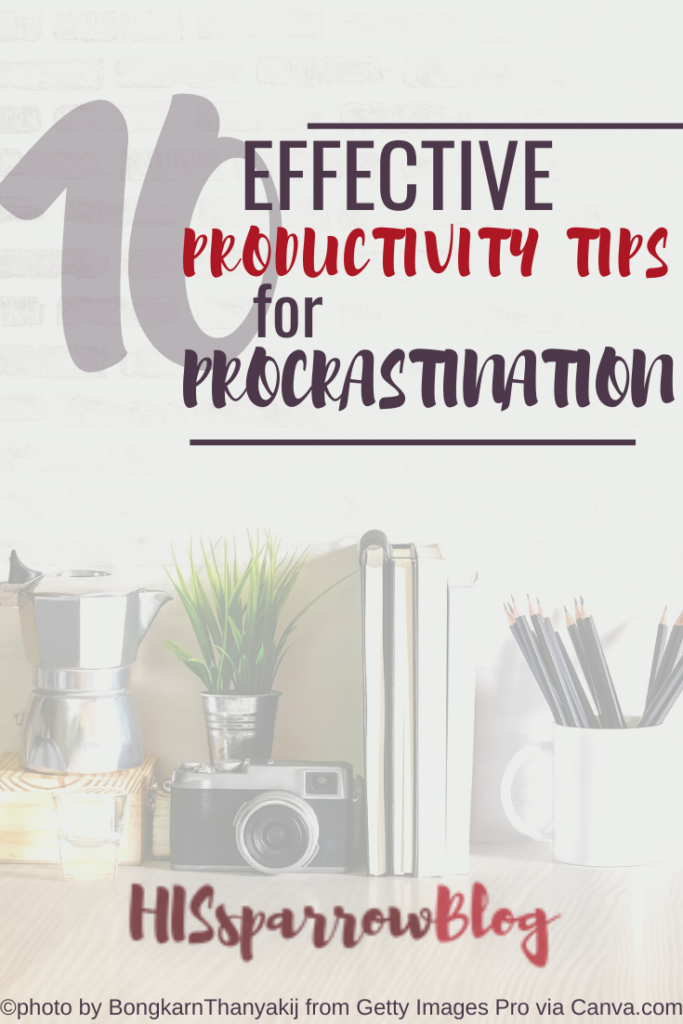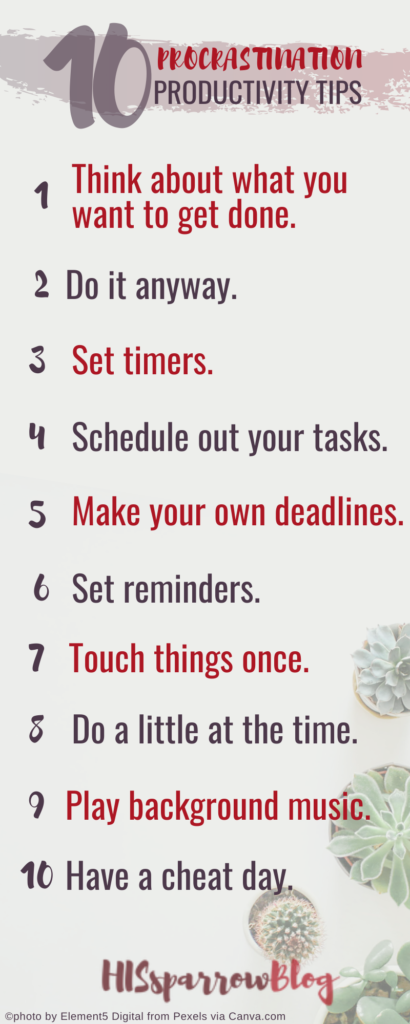According to my research, about twenty percent of people are chronic procrastinators.
I was a little surprised at that number the first time I saw it: In a paradoxical way, procrastination seems more prevalent than that to me while, at the same time, I’ve always felt alone in my own struggle with it.
Just think about New Year’s resolutions for example. The general consensus is that only about 8-9 percent of those who make resolutions stick to them. In fact, you may be reading these words now thinking about that resolution you’ve already given up on.
Procrastination can be a serious problem. It can be a constant emotional struggle with feelings of guilt and shame. There can even be physical repercussions between the emotional impact and delaying things important to health.
You know…like that time you put off going to the dentist for five years because you were afraid to find a new one. Oh, wait: I think that was me.

Why Do We Procrastinate?
It’s always good to talk about the why in a situation. Now I’m no psychologist, but, as a life-long procrastinator, I’ve learned a few things the hard way.
Interestingly, too, this blog has helped me make great strides. If I procrastinated with everything related to this blog, I wouldn’t get anything done. There’s way too much to do.
Anyway, back to the part about my not being a psychologist…There’s that. But here are a few things I’ve found to be true for me.
#1 – Lack of Motivation
If you’ve struggled with procrastination, you’re probably thinking duh right now. Motivation is huge for a procrastinator, and it can be a huge mystery as to why it’s so darn difficult to keep to the task.
Hey, look at this funny dog video…
#2 – Lack of Energy
I struggle with a chronic illness called Fabry disease that makes me feel tired a lot of the time. I’m learning more and more, though, that we all get tired sometimes.
When looking at a monumental and scary task, it’s normal to evaluate our energy levels. Many times my energy tank just doesn’t have enough for a huge task.
#3 – Guilt and Shame
Oh, the guilt. I feel guilty I’m not doing what I’m supposed to be doing. I sit down to do it and still feel guilty. My mind moves on to something else, and then the shame hits.
I’m convinced guilt and shame are the biggest blocks to my productivity.
#4 – Perfectionism
This might seem like an excuse, but sometimes my standards hinder my progress. And by hinder my progress I mean I make no progress.
Discouragement overwhelms me when I can’t seem to translate what’s in my head to the paper—or whatever I’m supposed to do—and frustration leads me to use the excuse that I’ll work on it later.
#5 – Fear of Failure
This goes along a bit with perfectionism, but it’s definitely worth its own point.
Oh, the feelings. The overwhelming feelings. Can I really do this?
In writing this post the irony strikes me hard: if fear of failure halts all progress then it’s a self-fulfilling prophecy.
Not doing anything certainly won’t get anything done.

Tips for Procrastination
The struggle is real, but I’ve come to realize that procrastination along with its guilt and shame don’t have to control my life.
As I learn more about myself, I learn more about how to work with the strengths God gave me, and I learn that there’s no shame in my weaknesses.
As I learn more about myself, I learn more about how to work with the strengths God gave me, and I learn that there's no shame in my weaknesses. #procrastinationtips Share on X#1 – Think about what you want to get done instead of how you feel.
It feels good to get things done—even for a procrastinator—so just thinking about that feeling instead of how I feel in the moment can get me going.
Instead of focusing on those negative feelings blocking my productivity, I can redirect that focus to more useful motivation.
And on that note…sometimes I can really find the inspiration and motivation I need to do something big by completing a smaller, easy task first.
#2 – Do it anyway.
Well, maybe I should say “work on it anyway.”
Using this rule in my life has helped me with so much: this blog is one huge example and a simpler one would be building the habit of flossing. Go me.
I’ve found that if I choose to ignore that feeling, then one day I realize it’s gone. I know I’ve won when I just do whatever it is with no urge to put it off.
This tidbit has helped me enormously with the sense of shame that comes with procrastination, because instead of allowing those changeable feelings to control me, I’m boss.
And there’s no shame in that.
#3 – Set timers.
Setting a timer has helped me so much. It seems so simple, but it works.
Take this post for example: I set my timer for 5:30. Only about twenty minutes.
There isn’t a gaping expanse of time or a huge amount of work overwhelming my fear of failure or energy level. Instead, there’s a set amount of time to focus on this task. What I get done in that time is what I get done.
But the beautiful thing about it? When I’m not against an immediate deadline, I don’t have to finish it now. I work in small manageable bursts til the work is done.
I’ve found it helps me work through the lack of motivation, and usually I don’t want to quit when the time is up. It’s 5:50 now. I’m a full twenty minutes past the time I set.
There is also a technique I’ve read a lot about in the writing world called the pomodoro technique. Basically, you set a timer for say twenty minutes to work on a task. Then take a five minute break. And go back and forth for whatever amount of time you’re working.
I’ve found I do need to stick in there for my blocks or I won’t come back, but this technique works great for a lot of other people.
#4 – Schedule out your tasks.
Never in a million years would I have ever thought I’d be a scheduler, but learning to run a blog has taught me the value in it.
Knowing that I have a time to get things done really helps with the guilt. When it’s time to rest or have downtime, I know I’ve earned it.
And by scheduling things at times when I am naturally more energized—like writing in the evening or doing simpler projects on Mondays when I know motivation can be an issue—I can get stuff done.
#5 – Make your own deadlines.
This point is similar to the previous one, but it deserves its own place on the list. Motivation is so hard to come by when there are no looming deadlines, so making my own tricks the procrastinator in me.
#6 – Set reminders.
Smartphones are such valuable tools. And they’re always with us.
I set reminders when I think about what I need to do later. As the productivity YouTuber Amy Landino says, “if you want it done, schedule it.”
#7 – Touch things once.
I don’t have the energy to be inefficient. I’m guessing that describes most of us in one way or the other.
Laundry has been an instrumental example in teaching me this tidbit. It’s easy to keep moving it around the room. Now I take ten minutes to fold a load. And voila—it’s done.
But this tip is proving useful in other areas of my life, too.
#8 – Do a little at the time.
Sometimes I am physically limited in what I can do since I have a chronic illness. Sometimes I just put things off because even the thought of all that needs doing is overwhelming.
But I have adopted the mantra that doing a little at the time is progress. It’s helped me so much to not get discouraged and then stop altogether.
Doing a little at the time is progress. #procrastinationtips Share on X#9 – Play background music.
Music is great for evoking emotion. It can help pick us up when we need it.
I listen to music most of the day because it also helps me to focus on the task at hand.
#10 – Have a cheat day.
This tip may seem counter-intuitive, but it does help me.
Now I do have to be careful with it as the procrastinator in me is prone to declare every day cheat day, so I do have a rule or two about when it’s acceptable to use:
- If I’ve been doing well in that area for a while…
- If I remind myself that this cheat day is only one day…
Something about having a cheat day is good for my psychology. Maybe it’s like dieting: They say starving yourself is ineffective and even detrimental, since you’ll get tired of the deprivation.
Procrastination can be a struggle for many of us, but when we understand more about it and ourselves, we can turn our weaknesses into strengths.
With no shame.
Do you struggle with procrastination? What tips help you? Let me know in the comments below.
More info…
- Amy Landino (YouTube Channel on Productivity)
- Christian Behavior: How Good Are We Really At These Simple Social Graces? from HISsparrowBlog
- 4 Reasons Negative Self-Talk Needs To Go from HISsparrowBlog
- Personality and the Bible {and 5 Tips for Both Types} from HISsparrowBlog
- My Rainy-Day Playlist from HISsparrowBlog

I frequently link up with the following: Grace & Truth with Embracing the Unexpected, Tell His Story with Jeanne Takenaka, Let’s Have Coffee with Joanne Viola, and Blessing Bloggers with Deb Wolf.





Love your tips. I am not a procrastinator, in many things, but I am in a few. But I use just about every tip you have here. Love timers. They allow me to focus on one thing and then remind me to do the next or stop and pull the clothes from the dryer (which my current timer is set for).
Timers are really time savers. 😉 Thanks so much for stopping by, Theresa!
Thank you for sharing these tips. I have used some of them. I do need to improve though. Blesings.
Thank you for stopping in, Paula!
So many great tips here! I’ve always used my timer, but I’ve begun using it even more lately to work in 25/5 minute increments. I work for 25 minutes (and I use “work” loosely–it could be writing a blog post, doing the laundry, etc.), then take a 5 minute break to get up and move about. It does make a difference!
That technique can be quite useful! Thank you for commenting today, Lisa!
This is such a great post! I am not a procrastinator in all areas of my life, but there are some areas where I just put things off. And, in my writing, if I am stuck because I don’t know what needs to come next, I put it off. And before I know it, it’s been days since I touched my manuscript. In that aspect, I’m learning to ask a writing friend for help to get unstuck. In other areas of my life, I like the set a timer and do a bit each day technique. I find that I don’t feel as overwhelmed by the task, and getting a little done each day allows me to see progress on bigger projects. The timer helps me work hard for that time period and then feel okay about moving to my next task. What a great topic, and what great suggestions you’ve shared!
You bring up an excellent point, Jeanne! A timer really helps with really large tasks. The elephant a little at the time… 😉 Thanks so much for stopping in!
Love these tips and especially ‘working with the strengths that God has given us and knowing that there’s no shame in our weaknesses’. Thank you for sharing.
So glad you were encouraged today, Wemi! Thank you for stopping in!
This is a great post! I have struggled with procrastination all of my life, mostly due to anxiety, performance and fear of failure issues. This is the best list of tips I have found, thank you for his great help to me!
So glad it helped you, Donna!
Thanks for this post! It’s definitely a struggle & I appreciate your perspective!
Thanks for commenting, Elaine!
Procrastination is not evident in all aspects of my life, but when it shows up … I don’t like it. It is overwhelming to catch up. Thank you for your suggestions as I am sure it will be a help to so many.
Thanks for stopping in, Joanne!
I can think of many who would benefit from your advice, myself included! Thanks so much for sharing!
Kara
amidstthebroken.com
Thank you, Kara!